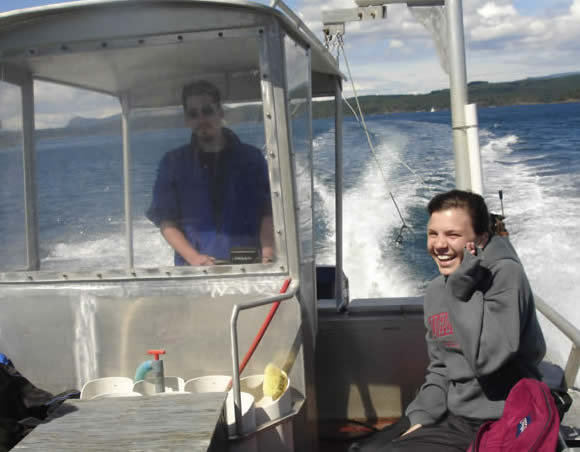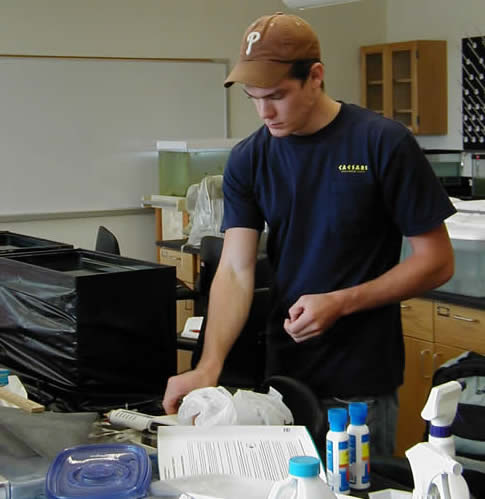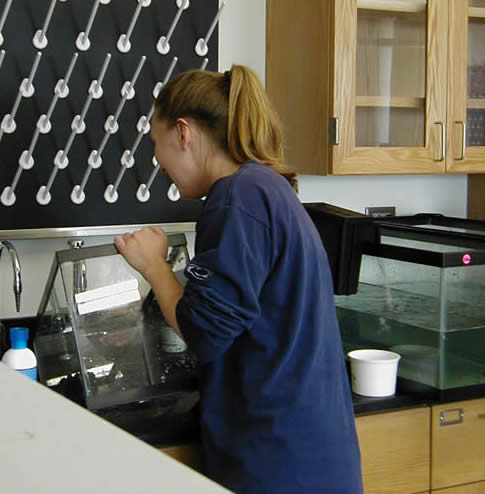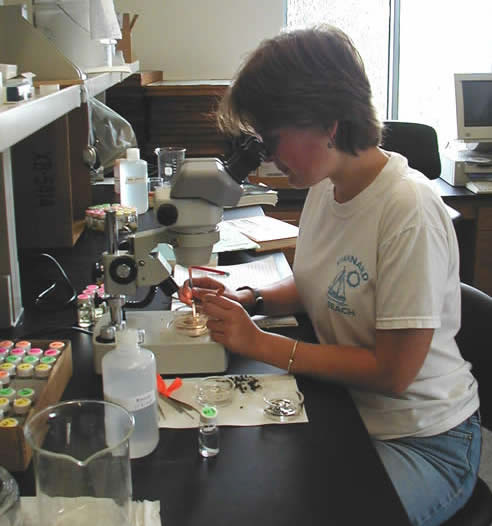Dr. Erika Iyengar
Professor of Biology
Office: 320 NSB, Research Lab: 321 NSB
Email: [email protected]
Phone: 484-664-3731
FAX: 484-664-3002
B.S. with honors, Biology Dept., Stanford University
Ph.D. in Zoology, Cornell University; Thesis title: "The ecology and evolutionary biology of the marine facultative kleptoparasite Trichotropis cancellata (Mollusca, Gastropoda)"
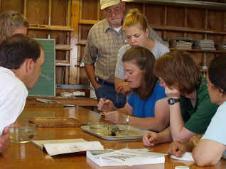
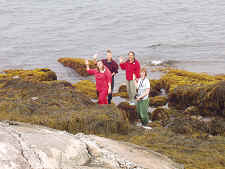
Click below to get to the listed subsection:
"Just remember,
no matter where
you go, there you are."
from The Adventures of
Buckaroo Bonzai 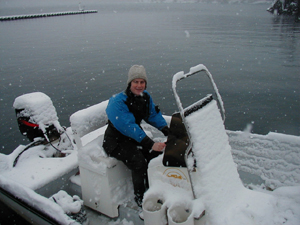
Courses Taught
- Concepts of Biology: Animal Behavior (BIO 116)
- Principles of Biology I (BIO 150)
- Invertebrate Zoology (BIO 204)
- Ecology (BIO 270)
- Freshwater Ecology (BIO 281)
- Field Marine Biology (BIO 282)
- Evolution (BIO 470) --writing intensive, capstone course
Special course involving off-campus field work:
Field Marine Biology (Fall semester course with August work at a marine field station) Click here to a link to that course’s web page
Personal Background
I am originally from Media, Pennsylvania, about half an hour outside of Philadelphia. I received my B.S. with honors in Biological Sciences from Stanford University. Afterwards, I worked as the Life Sciences Intern at The Exploratorium, a science museum in San Francisco. I moved to Ithaca, New York where I worked as a laboratory technician at Cornell University, working first on induced resistance in tomatoes and later on defense in marine invertebrates, especially echinoderm larvae. I entered graduate school at Cornell University and received my Ph.D. in January 2002. My thesis investigated the behavioral ecology of feeding in a marine snail. Most of my research was performed subtidally (underwater, using SCUBA equipment) at the Friday Harbor Laboratories (FHL) in the San Juan Islands, near Seattle, Washington. I still often perform research at FHL during the summer, and have brought a number of Muhlenberg students out there to do research with me. For information about the Friday Harbor Laboratories, click here.
After receiving my doctorate (Ph.D.), I taught for one year in the Biology Department at The College of Wooster and I also (on my breaks) worked as an Undersea Specialist, guiding ecotours in Baja California and southeast Alaska with Lindblad Expeditions. These two regions of the world are amazing. Ask me more about them if you are looking for an awesome place to visit and learn a lot about some unusual ecology and ecosystems! I joined Muhlenberg College’s Biology Department in 2003.
I study the ecology of invertebrates, with a particular focus on symbiotic interactions and feeding and defense in marine invertebrates. I use an understanding of the present-day ecology of organisms to shed light on evolutionary questions. My summer research often occurs at sites near the Friday Harbor Laboratories (FHL), on San Juan Island, Washington State, and I have brought Muhlenberg students out to FHL to perform research with me. For one major set of my projects, I am examining
epibiotic snails that live on other organisms. How species-specific are these symbiotic interactions, why choose one host over another, and what sorts of benefits and costs are incurred by the epibionts and hosts? Much of my recent work has involved the snail Crepidula adunca, which mostly specializes on the top snail Calliostoma ligatum in the San Juan Islands. I am also fascinated by suspension-feeding snails (Crepidula spp. Feed in this manner). These snails collect food from the water column, usually by trapping food particles on their gill. Water needs to travel over the gill anyway so that the snail can obtain oxygen, and the food particles in non-suspension feeding snails are rejected as waste. Why not eat those scrumptious morsels? This is exactly how most bivalves (clams, oysters, scallops, also in the Phylum Mollusca) feed. Yet comparatively few aquatic snails feed in this way, even though this feeding mode is thought to have evolved multiple times. Why? No one knows—but I enjoy contemplating this as I study suspension feeding snails (such a Crepidula spp. and Trichotropis spp.).
On-campus, projects in my lab also involve defense strategies of fresh water (stream and pond) insects and snails. I am particularly interested in inducible defenses: defenses that are deployed only when the prey receives a specific cue from a predator. Otherwise, the prey remains undefended. Such inducible defenses might be behavioral, but I am more interested in structural, morphological changes that occur, especially when a prey is faced with cues from various potential predators that forage in different ways. No one individual can do everything, so how does a prey prioritize which defense to deploy?If you are a student interested in the behavior or ecology of aquatic invertebrates, stop by and let's discuss some of your ideas, interests and possible future programs you might want to investigate.
Publications (current as of 2010)
Peer-reviewed publications; * indicates an undergraduate co-author
- Iyengar, E.V., Sitvarin*, M.I., and M. Cataldo*. 2008. Function of the flexible periostracalhairs in Trichotropis cancellata (Mollusca, Gastropoda). Invertebrate Biology. 127: 299-313.
- Iyengar, E.V. 2008. Kleptoparasitic interactions throughout the animal kingdom and a re-evaluation, based on participant mobility, of the conditions promoting the evolution of kleptoparasitism. Biological Journal of the Linnean Society. 93: 745-762.
- Iyengar, E.V. 2008. Suspension feeding and kleptoparasitism within the genus Trichotropis (Gastropoda: Capulidae). Journal of Molluscan Studies 74: 55-62.
- Iyengar, E.V. 2005. Seasonal feeding mode changes in the marine facultative kleptoparasite Trichotropis cancellata (Gastropoda, Capulidae): trade-offs between trophic strategy and reproduction. Canadian Journal of Zoology. 83: 1097-1111.
- Iyengar, E.V. 2004. Host-specific performance and host use in the kleptoparasitic marine snail Trichotropis cancellata. Oecologia. 138: 628-639.
- Iyengar, E.V. 2002. Sneaky snails and wasted worms: kleptoparasitism by Trichotropis cancellata (Mollusca, Gastropoda) on Serpula columbiana (Annelida, Polychaeta).Marine Ecology Progress Series. 244: 153-162.
- Iyengar, E.V. and C.D. Harvell. 2002. Specificity of cues triggering inducible spines in the bryozoan Membranipora membranacea. Marine Ecology Progress Series. 225: 205-218.
- Iyengar, E.V. and C.D. Harvell. 2001. Predator deterrence of early developmental stages of temperate lecithotrophic asteroids and holothuroids. Journal of Experimental Marine Biology and Ecology. 264: 171-188.
- Pollock, D.D., W.B. Watt, V.K. Rashbrook, and E.V. Iyengar. 1998. Molecular phylogeny for Colias butterflies and their relatives (Lepidoptera: Pieridae). Ann. Entomol. Soc. Am.,Vol 91, pp. 524-531.
Selected published non-peer-reviewed articles & other educational material
- Iyengar, E.V. 2009. Darwin a tale of inspiration, caution. The Morning Call (newspaper), Focus on Science. November 8, 2009.
- Iyengar, E.V. 2009. Darwin: a survivor of the historical fittest. Muhlenberg Weekly (college newspaper), 11/5/09 Section: News.
- Iyengar, E.V. 2009. How is Darwin still relevant today? Biology department website, http://www.muhlenberg.edu/main/academics/biology/programs/darwin.html
- Iyengar, E.V. 2009. Kleptoparasitic thieves are everywhere, guard your food! Of Sea and Shore magazine, on-line article plus video clip. http://www.ofseaandshore.com/article/kleptopaper/kleptopaper.php
- Iyengar, E.V. 2008. Leading a wild-life of crime. (A review of kleptoparasitism in the animal kingdom) BBC Wildlife magazine. 26: 66-68.
- Iyengar, E.V. 2006. “Saving water, saving resources,” article published in the on-line version of E magazine-the magazine for the environment (March 2006).
- Iyengar, E.V. 2005. Muhlenberg students tapping their imaginations to save water. The Morning Call(newspaper). Focus on Science. June 7, 2005.
- Wrote the text for two informational stops (both dealing with aquatic ecology) on the Educational Trail at Grosjean Park in Wooster, Ohio. (Spring 2004)
- Iyengar, E.V. 2001. The evolutionary ecology of kleptoparasitism and suspension feeding in Trichotropis cancellata (Gastropoda). Bulletin of the Malacological Society of London. 37: 1, 14.
- Iyengar, E.V. 2001. Voyage of voyages. Ship's log for the M.V. Sea Bird, March 24-April 7, 2001. Baja California, Mexico. (published by Lindblad Expeditions for their guests and for use as promotional material)
- Iyengar, E.V. 2001. Video "The best of underwater Baja, 2001." Contributor of undersea video footage. Video distributed by Lindblad Expeditions.
- Iyengar, E.V. 1999. Why work when you can steal? American Conchologist, Vol. 27, p. 14
Back to Top Some past research students in action
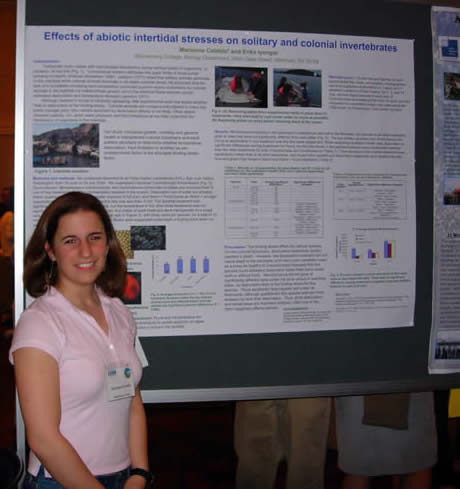
Marianne presenting at the Benthic Ecology conference in Virginia
Karly and Mike coming back from collecting at FHL
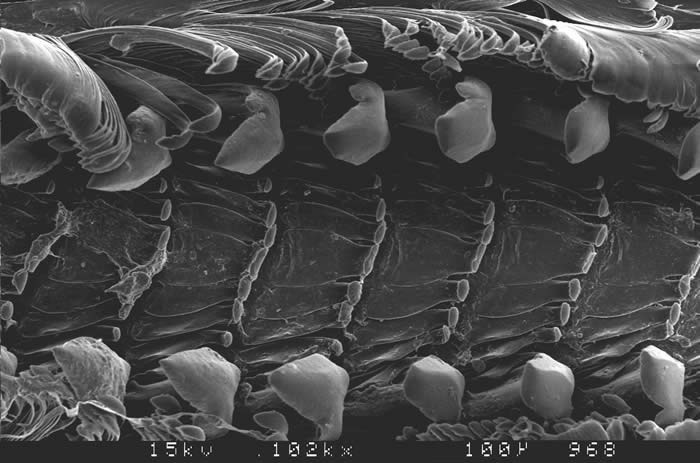
Stacey's scanning electron micrograph of a radula from a snail
Greg setting up inducible defense growth experiments on campus
Jen changing water between trials: amphipod responses to predator cues
Emily sorting and identifying stream insects on campus
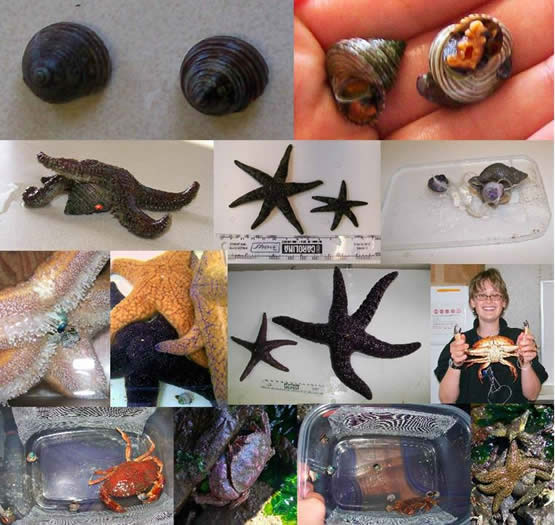
Emily and her various research animals at Friday Harbor Labs
